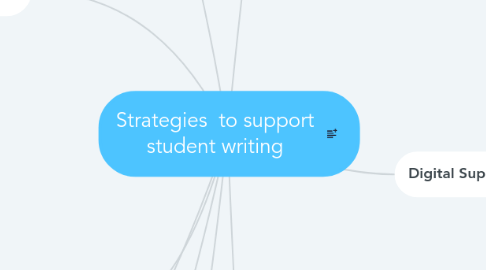
1. discomfort of being critical of a writers'/experts work
2. Digital Support for writing
2.1. Discovering
2.1.1. Finding
2.1.1.1. Google Alerts
2.1.1.2. ResearcherApps
2.1.1.3. Social media
2.1.2. Recording
2.1.2.1. Zotero
2.1.2.2. Mendeley
2.1.2.3. Colwiz
2.1.2.4. Citethisforme
2.1.2.5. Endnote
2.2. Organising
2.2.1. Evernote
2.2.2. OneNote
2.2.3. GoogleKeep
2.2.3.1. Sonocent usages note taking | Sonocent
2.2.4. Audio notetaking
2.2.4.1. Livescribe smart pens
2.2.4.2. Audionote
2.3. Deciding
2.3.1. Mindmapping
2.3.2. Linear mapping with Word
2.3.3. Workflowy
2.4. Drafting
2.4.1. Voice recognition (composition)
2.4.1.1. Google voice typing (Tools menu of Google Docs)
2.4.1.2. Microsoft Dictate
2.4.1.3. Mobile apps - Siri, Google
2.4.1.4. Audio record and then transcribe
2.4.1.5. Dragon Naturally Speaking
2.4.2. Handwriting conversion
2.4.2.1. annotations
2.4.2.2. onenote/evernote
2.4.2.2.1. onenote will do conversion of handwriting
2.4.2.2.2. onenote will do outlining
2.4.3. Word prediction
2.4.4. Word / phrase banks
2.5. Language
2.5.1. Style and level checking
2.5.1.1. Hemingway App
2.5.1.2. Microsoft Word
2.5.2. Grammarly
2.5.3. Inbuilt Synonyms
2.6. Editing
2.6.1. Text to speech (review and critique)
2.6.2. Inbuilt Editing/Spell/Grammar checker in Word
3. reasons for writing
3.1. teaching perspective
3.1.1. assessment
3.1.2. To improve students' ability to...
3.1.2.1. communicate and synthesize
3.1.3. one-minute paper
3.2. learner perspective
3.2.1. consolidating reading
3.2.2. note-taking
3.2.3. assessment
3.2.4. communication
3.2.4.1. social media posts
3.2.4.2. forums
3.2.4.3. emails
3.2.5. synthesize
3.2.5.1. blogging
3.2.5.2. journals
4. types of writing
4.1. public facing
4.1.1. blogging
4.1.2. social media posts
4.1.3. reports
4.1.4. emails
4.2. personal
4.2.1. diaries/journals
4.2.2. reflective logs
4.2.3. visual notetaking
4.2.3.1. sketchnote, doodling
4.2.3.2. mindmapping
4.3. genres
4.3.1. academic
4.3.2. editorial
4.3.3. etc
5. offer writing alternatives
5.1. What
5.1.1. podcasts
5.1.1.1. Audacity
5.1.2. Screenr, screencastomatic, textivate, PowerPoint.
5.1.3. Presentation tools
5.1.4. vlogs and youtube channel
5.2. How and who?
5.2.1. eportfolios
5.2.2. disabled or all?
5.2.3. awarding bodies
6. referencing
7. plagiarism
8. pedagogy
8.1. cognitive
8.1.1. drag and drop exercise to practice forming coherent sentences.
8.1.2. providing students with assessment rubrics
8.2. rhetorical
8.3. metacognitive
8.3.1. scaffolding methods
8.3.2. Word doc or google doc to mark up.
8.3.3. Google Docs/synchronous writing tools
8.4. communicative
8.5. social/affective
8.5.1. eg creative writing in Law
